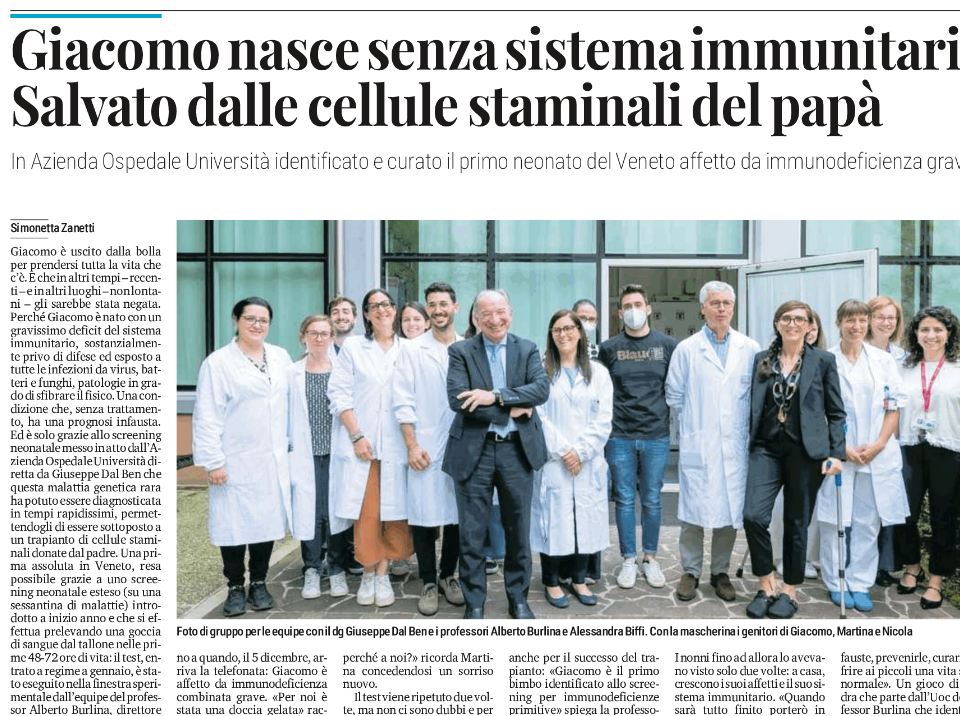ERACLEA In tanti alla Marcia della solidarietà
14 Giugno 2005Blunt announces improved health screening for newborns
17 Giugno 2005Newborn Screening Tests
“KidsHealth.org Thu Jun 16, 8:00 PM ET
Newborn screening is the practice of testing every newborn for certain harmful or potentially fatal disorders that are not otherwise apparent at birth. Many of these are metabolic disorders, often called “inborn errors of metabolism,” which interfere with the body’s use of nutrients to maintain healthy tissues and produce energy. Other disorders that may be detected through screening include problems with hormones, vitamin levels, or the blood.
In general, metabolic and other inherited disorders can hinder an infant’s normal physical and mental development in a variety of ways. And parents can pass along the gene for a certain disorder without even knowing that they’re carriers.
With a simple blood test, doctors often can tell whether newborns have certain conditions that could eventually cause problems. Even though these conditions are considered rare and most babies are given a clean bill of health, early diagnosis and proper treatment can make the difference between lifelong impairment and healthy development.
Newborn Screening: Past, Present, and Future
In the early 1960s, scientist Robert Guthrie, PhD, developed a blood test that could determine whether newborn babies had a metabolic disorder known as phenylketonuria (PKU). People with PKU lack an enzyme needed to process the amino acid phenylalanine. This amino acid is necessary for normal growth in infants and children and for normal protein use throughout life. However, if too much of it builds up, it damages the brain tissue and can eventually cause mental retardation.
When babies with PKU are put on a special diet right away, they often can avoid the mental retardation that children with PKU suffered in the past. By following certain dietary restrictions, these children can lead normal lives.
Since the development of the PKU test, researchers have developed additional blood tests that can screen newborns for other disorders that, unless detected and treated early, can cause physical problems, mental retardation, and in some cases, death. All states, the District of Columbia, Puerto Rico, and the U.S. Virgin Islands now have their own mandatory newborn screening programs. Because the federal government has set no national standard, screening requirements vary from state to state, as determined by individual state public health departments.
Consequently, the comprehensiveness of these programs varies, with states routinely screening for anywhere from four to 30 disorders. The average state program tests from four to 10 disorders.
State requirements tend to change periodically as well. In fact, the pace of change is speeding up, thanks to the development of a new screening technique known as tandem mass spectrometry. This technology, which can detect the blood components that are elevated in certain disorders, is capable of screening for more than 20 inherited metabolic disorders with a single test.
Some states are already offering expanded screening with tandem mass spectrometry through pilot studies. However, there’s some controversy over whether the new technology has been tested adequately. Also, some experts want more evidence that early detection of every disease tested for will actually offer babies some long-term benefit, equally important, parents may not want to know ahead of time that their child will develop a serious condition when there are no medical treatments or dietary changes that can improve the outcome. And some questions about who will pay (states, insurance companies, or parents) for the newer technology have yet to be resolved.
The American Academy of Pediatrics (AAP) and the federal government’s Health Resources and Services Administration convened a task force of experts to grapple with these issues and recommend next steps. Their report identified some flaws and inconsistencies in the current state-driven screening system and proposed the following:
All states should test for the same disorders.
Parents should be informed about screening procedures and have the right to refuse screening, as well as the right to keep the results private and confidential.
Parents should be informed about the benefits and risks associated with newborn screening.
Traditionally, state decisions about what to screen for have been based on weighing the costs against the benefits. “Cost” considerations include:
the availability of treatments proven to help the condition
financial costs
So what can you do? Your best strategy is to stay informed. Discuss this issue with both your obstetrician and your future baby’s doctor before you give birth. Know what tests are routinely done in your state and in the hospital where you’ll deliver (some hospitals go beyond what is required by state law). You may also want to ask your doctors about supplemental screening – keep in mind, though, that you’ll probably have to pay for additional tests out of your own pocket.
If you’re the parent of an infant and are concerned about whether your child was screened for certain conditions, ask your child’s doctor for information about which tests were performed and whether further tests are recommended.
“




